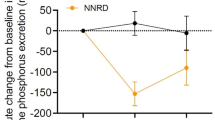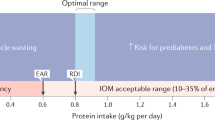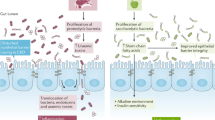Abstract
For many years patients with chronic kidney disease have been advised to control the protein content of their diet. This advice has been given on the basis of a number of reported metabolic effects of lowering protein intake, such as lowering serum urea nitrogen levels, improving phosphocalcic metabolism and insulin resistance and, more recently, ameliorating proteinuria (independent of antiproteinuric medications). The effects on the progression of kidney disease, although spectacular in experimental studies, have been less convincing in humans. It is possible that flawed design of clinical trials is responsible for this discrepancy. In this Review, we comment on experimental findings that indicate that limiting protein intake protects the kidney and ameliorates uremic symptoms, outline how the body adapts to a reduction in protein intake, and describe the metabolic benefits to the patient. We then review the evidence from randomized controlled trials and meta-analyses that pertains to the effects of low-protein diets in adults with chronic kidney disease.
Key Points
-
A high protein load acutely increases glomerular filtration rate, and severity of microalbuminuria and glomerulosclerosis
-
Protein restriction can improve insulin sensitivity, lipid profile and blood pressure, and ameliorate proteinuria, renal osteodystrophy and metabolic acidosis
-
The few high-quality clinical trials of low-protein diets that have been conducted have not detected the same degree of kidney protection as experimental studies
-
Nevertheless, a threshold of 'safe' protein intake for patients with chronic kidney disease of 0.6–0.8 g protein/kg body weight/day is recommended
-
Compliance with low-protein diets can be poor, and individualized monitoring is necessary
This is a preview of subscription content, access via your institution
Access options
Subscribe to this journal
Receive 12 print issues and online access
$209.00 per year
only $17.42 per issue
Buy this article
- Purchase on Springer Link
- Instant access to full article PDF
Prices may be subject to local taxes which are calculated during checkout

Similar content being viewed by others
References
Kopple JD (1987) Uses and limitations of the balance technique. JPEN J Parenter Enteral Nutr 11 (Suppl): S79–S85
Kopple JD (1997) McCollum Award Lecture, 1996: protein-energy malnutrition in maintenance dialysis patients. Am J Clin Nutr 65: 1544–1557
Maroni B et al. (1985) A method for estimating nitrogen intake of patients with chronic renal failure. Kidney Int 27: 58–65
Aparicio M et al. (1988) Effect of a low-protein diet on urinary albumin excretion in uremic patients. Nephron 50: 288–291
Gansevoort RT et al. (1995) Additive antiproteinuric effect of ACE inhibition and a low-protein diet in human renal disease. Nephrol Dial Transplant 10: 497–504
Jafar TH et al. (2001) Proteinuria as a modifiable risk factor for the progression of non-diabetic renal disease. Kidney Int 60: 1131–1140
de Zeeuw D et al. (2004) Proteinuria, a target for renoprotection in patients with type 2 diabetic nephropathy: lessons from RENAAL. Kidney Int 65: 2309–2320
K/DOQI, National Kidney Foundation (2000) Clinical practice guidelines for nutrition in chronic renal failure. Am J Kidney Dis 35 (Suppl 2): S1–S140
Toigo G et al. (2000) Expert Working Group report on nutrition in adult patients with renal insufficiency (part 1 of 2). Clin Nutr 19: 197–207
Toigo G et al. (2000) Expert working group report on nutrition in adult patients with renal insufficiency (part 2 of 2). Clin Nutr 19: 281–291
Mitch WE and Remuzzi G (2004) Diets for patients with chronic kidney disease, still worth prescribing. J Am Soc Nephrol 15: 234–237
Diamond J (1990) Effects of dietary interventions on glomerular pathophysiology. Am J Physiol 258: F1–F8
Premen AJ (1988) Potential mechanisms mediating postprandial renal hyperemia and hyperfiltration. FASEB J 2: 131–137
Mauer SM et al. (1989) Effects of dietary protein content in streptozotocin-diabetic rats. Kidney Int 35: 48–59
Brenner BM (1985) Nephron adaptation to renal injury or ablation. Am J Physiol 249: F324–F337
Hostetter TH et al. (1981) Hyperfiltration in remnant nephrons: a potentially adverse response to renal ablation. Am J Physiol 241: F85–F93
Kleinknecht C et al. (1979) Effect of various protein diets on growth, renal function, and survival of uremic rats. Kidney Int 15: 534–541
Hadj-Aissa A et al. (1992) Influence of the level of hydration on the renal response to a protein meal. Kidney Int 42: 1207–1216
Hostetter TH et al. (1986) Chronic effects of dietary protein in the rat with intact and reduced renal mass. Kidney Int 30: 509–517
Nath KA et al. (1986) Dietary protein restriction in established renal injury in the rat: selective role of glomerular capillary pressure in progressive glomerular dysfunction. J Clin Invest 78: 1199–1205
El-Nahas AM et al. (1983) Effect of dietary protein restriction on the development of renal failure after subtotal nephrectomy in rats. Clin Sci (Lond) 65: 399–406
Kenner CH et al. (1985) Effect of protein intake on renal function and structure in partially nephrectomized rats. Kidney Int 27: 739–750
Harris DC and Tay C (1993) Altered metabolism in the ex vivo remnant kidney. II. Effects of metabolic inhibitors and dietary protein. Nephron 64: 417–423
Bankir L and Kriz W (1995) Adaptation of the kidney to protein intake and to urine concentrating activity: similar consequences in health and CRF. Kidney Int 47: 7–24
Jarusiripipat C et al. (1991) Reduction of remnant nephron hypermetabolism by protein restriction. Am J Kidney Dis 18: 367–374
Wiseman MJ et al. (1987) Dietary composition and renal function in healthy subjects. Nephron 46: 37–42
Soroka N et al. (1998) Comparison of a vegetable-based (soya) and an animal-based low-protein diet in predialysis chronic renal failure patients. Nephron 79: 173–180
Williams AJ et al. (1987) Effect of varying quantity and quality of dietary protein intake in experimental renal disease in rats. Nephron 46: 83–90
Nakayama M et al. (1996) Short- or long-term effects of a low-protein diet on fibronectin and transforming growth factor-beta synthesis in Adriamycin-induced nephropathy. J Lab Clin Med 127: 29–39
Peters H et al. (2000) Angiotensin II blockade and low-protein diet produce additive therapeutic effects in experimental glomerulonephritis. Kidney Int 57: 1493–1501
Wang S et al. (2001) Connective tissue growth factor in tubulointerstitial injury of diabetic nephropathy. Kidney Int 60: 96–105
Dixon R and Brunskill NJ (1999) Activation of mitogenic pathways by albumin in kidney proximal tubule epithelial cells: implications for the pathophysiology of proteinuric states. J Am Soc Nephrol 10: 1487–1497
Thomas ME et al. (1999) Proteinuria induces tubular cell turnover: a potential mechanism for tubular atrophy. Kidney Int 55: 890–898
Cirillo M et al. (1998) Effects of a meat meal on renal sodium handling and sodium balance. Miner Electrolyte Metab 24: 279–284
Munro HN et al. (1987) Protein nutriture of a group of free-living elderly. Am J Clin Nutr 46: 586–592
FAO/WHO/UNU (1985) Energy and protein requirements. Report of a Joint FAO/WHO/UNU Expert Consultation. WHO Technical Report Series no. 724. Geneva: OMS
Rand WM et al. (2003) Meta-analysis of nitrogen balance studies for estimating protein requirements in healthy adults. Am J Clin Nutr 77: 109–127
Kopple JD et al. (2000) Relationship between nutritional status and the glomerular filtration rate: results from the MDRD study. Kidney Int 57: 1688–1703
Ikizler TA et al. (1995) Spontaneous dietary protein intake during progression of chronic renal failure. J Am Soc Nephrol 6: 1386–1391
Pollock CA et al. (1997) Protein intake in renal disease. J Am Soc Nephrol 8: 777–783
Garg AX et al. (2001) Association between renal insufficiency and malnutrition in older adults: results from the NHANES III. Kidney Int 60: 1867–1874
Aparicio M et al. (2000) Nutrition and outcome on renal replacement therapy of patients with chronic renal failure treated by a supplemented very low protein diet. J Am Soc Nephrol 11: 708–716
Mitch WE et al. (1984) The effect of a keto acid-amino acid supplement to a restricted diet on the progression of chronic renal failure. N Engl J Med 311: 623–629
Walser M and Hill S (1999) Can renal replacement be deferred by a supplemented very low protein diet? J Am Soc Nephrol 10: 110–116
Bergstrom J (1984) Discovery and rediscovery of low protein diet. Clin Nephrol 21: 29–35
Kopple JD (2001) The National Kidney Foundation K/DOQI clinical practice guidelines for dietary protein intake for chronic dialysis patients. Am J Kidney Dis 38 (Suppl): S68–S73
Maiorca R et al. (2000) Diet or dialysis in the elderly? The DODE study: a prospective randomized multicenter trial. J Nephrol 13: 267–270
Rigalleau V et al. (1997) A low-protein diet improves insulin sensitivity of endogenous glucose production in predialytic uremic patients. Am J Clin Nutr 65: 1512–1516
Gin H et al. (1994) Effects of a low-protein, low-phosphorus diet on metabolic insulin clearance in patients with chronic renal failure. Am J Clin Nutr 59: 663–666
Rigalleau V et al. (2003) Splanchnic tissues play a crucial role in uremic glucose intolerance. J Ren Nutr 13: 212–218
Gin H et al. (1991) Low-protein, low-phosphorus diet and tissue insulin sensitivity in insulin-dependent diabetic patients with chronic renal failure. Nephron 57: 411–415
Aparicio M et al. (1990) Parathormone activity and rate of progression of chronic renal failure in patients on low-protein diet. Nephron 56: 333–334
Aparicio M et al. (1991) Low-protein diet and renal osteodystrophy. Nephron 58: 250–252
Lindenau K et al. (1990) Therapeutic effect of keto acids on renal osteodystrophy: a prospective controlled study. Nephron 55: 133–135
Bernard S et al. (1996) Effects of low-protein diet supplemented with ketoacids on plasma lipids in adult chronic renal failure. Miner Electrolyte Metab 22: 143–146
Peuchant E et al. (1997) Antioxidant effects of a supplemented very low protein diet in chronic renal failure. Free Radic Biol Med 22: 313–320
Kaysen GA et al. (1986) Effect of dietary protein intake on albumin homeostasis in nephrotic patients. Kidney Int 29: 572–577
Ruilope LM et al. (1992) Additive antiproteinuric effect of converting enzyme inhibition and a low protein intake. J Am Soc Nephrol 3: 1307–1311
Walser M et al. (1996) Treatment of nephrotic adults with a supplemented, very low-protein diet. Am J Kidney Dis 28: 354–364
de Jong PE et al. (1993) Glomerular preload and afterload reduction as a tool to lower urinary protein leakage: will such treatments also help to improve renal function outcome? J Am Soc Nephrol 3: 1333–1341
Ruggenenti P et al. (2003) Retarding progression of chronic renal disease: the neglected issue of residual proteinuria. Kidney Int 63: 2254–2261
Mitch WE (1995) Cellular mechanisms of catabolism activated by metabolic acidosis. Blood Purif 13: 368–374
Reaich D et al. (1995) Mechanisms causing muscle loss in chronic renal failure. Am J Kidney Dis 26: 242–247
Chauveau P et al. (2000) Acidosis and nutritional status in hemodialyzed patients. French Study Group for Nutrition in Dialysis. Semin Dial 13: 241–246
Chauveau P et al. (1999) Outcome of nutritional status and body composition of uremic patients on a very low protein diet. Am J Kidney Dis 34: 500–507
Bellizzi V et al. (2007) Very low protein diet supplemented with ketoanalogs improves blood pressure control in chronic kidney disease. Kidney Int 71: 245–251
Elliott P et al. (2006) Association between protein intake and blood pressure: the INTERMAP Study. Arch Intern Med 166: 79–87
Kopple JD et al. (1989) Nutritional status of patients with different levels of chronic renal insufficiency. Modification of Diet in Renal Disease (MDRD) Study Group. Kidney Int 27 (Suppl): S184–S194
Coresh J et al. (1995) Survival on dialysis among chronic renal failure patients treated with a supplemented low-protein diet before dialysis. J Am Soc Nephrol 6: 1379–1385
Masud T et al. (2002) The precision of estimating protein intake of patients with chronic renal failure. Kidney Int 62: 1750–1756
Bernhard J et al. (2001) Adaptive response to a low-protein diet in predialysis chronic renal failure patients. J Am Soc Nephrol 12: 1249–1254
Kopple JD et al. (1997) Effect of dietary protein restriction on nutritional status in the Modification of Diet in Renal Disease Study. Kidney Int 52: 778–791
Aparicio M et al. (2001) Low protein diets and outcome of renal patients. J Nephrol 14: 433–439
Walser M et al. (1999) Should protein intake be restricted in predialysis patients? Kidney Int 55: 771–777
Combe C et al. (1993) Compliance and effects of nutritional treatment on progression and metabolic disorders of chronic renal failure. Nephrol Dial Transplant 8: 412–418
Rosman JB et al. (1989) Protein-restricted diets in chronic renal failure: a four year follow-up shows limited indications. Kidney Int 27 (Suppl): S96–S102
Jungers P et al. (1987) Comparison of ketoacids and low protein diet on advanced chronic renal failure progression. Kidney Int 22 (Suppl): S67–S71
Williams PS et al. (1991) Failure of dietary protein and phosphate restriction to retard the rate of progression of chronic renal failure: a prospective, randomized, controlled trial. Q J Med 81: 837–855
Ihle BU et al. (1989) The effect of protein restriction on the progression of renal insufficiency. N Engl J Med 321: 1773–1777
Locatelli F et al. (1991) Prospective, randomised, multicentre trial of effect of protein restriction on progression of chronic renal insufficiency. Northern Italian Cooperative Study Group. Lancet 337: 1299–1304
Klahr S et al. (1994) The effects of dietary protein restriction and blood-pressure control on the progression of chronic renal disease. Modification of Diet in Renal Disease Study Group. N Engl J Med 330: 877–884
Malvy D et al. (1999) Effects of severe protein restriction with ketoanalogues in advanced renal failure. J Am Coll Nutr 18: 481–486
Di Iorio BR et al. (2003) Supplemented very low protein diet ameliorates responsiveness to erythropoietin in chronic renal failure. Kidney Int 64: 1822–1828
Fouque D et al. (1992) Controlled low protein diets in chronic renal insufficiency: meta-analysis. BMJ 304: 216–220
Pedrini MT et al. (1996) The effect of dietary protein restriction on the progression of diabetic and nondiabetic renal diseases: a meta-analysis. Ann Intern Med 124: 627–632
Kasiske BL et al. (1998) A meta-analysis of the effects of dietary protein restriction on the rate of decline in renal function. Am J Kidney Dis 31: 954–961
Fouque D et al. Low protein diets for chronic kidney disease in non diabetic adults. Cochrane Database of Systematic Reviews 2006, Issue 2. Art. No.: CD001892. DOI: 10.1002/14651858.CD001892.pub2
Rosman JB et al. (1984) Prospective randomised trial of early dietary protein restriction in chronic renal failure. Lancet 2: 1291–1296
Levey AS et al. (1999) Dietary protein restriction and the progression of chronic renal disease: what have all of the results of the MDRD study shown? Modification of Diet in Renal Disease Study group. J Am Soc Nephrol 10: 2426–2439
Fouque D et al. (2000) Low protein diets delay end-stage renal disease in non-diabetic adults with chronic renal failure. Nephrol Dial Transplant 15: 1986–1992
Author information
Authors and Affiliations
Corresponding author
Ethics declarations
Competing interests
Drs Fouque and Aparicio have received speakers fees from Fresenius-Kabi.
Rights and permissions
About this article
Cite this article
Fouque, D., Aparicio, M. Eleven reasons to control the protein intake of patients with chronic kidney disease. Nat Rev Nephrol 3, 383–392 (2007). https://doi.org/10.1038/ncpneph0524
Received:
Accepted:
Issue Date:
DOI: https://doi.org/10.1038/ncpneph0524
This article is cited by
-
Progressionsverlangsamung – Rolle von Ernährung und Flüssigkeitszufuhr
Der Nephrologe (2022)
-
Green tea consumption increases sperm concentration and viability in male rats and is safe for reproductive, liver and kidney health
Scientific Reports (2020)
-
Effects of dietary protein intake on renal outcome and mortality in patients with advanced diabetic nephropathy
Clinical and Experimental Nephrology (2020)
-
Low protein diets in patients with chronic kidney disease: a bridge between mainstream and complementary-alternative medicines?
BMC Nephrology (2016)
-
Compliance, illiteracy and low-protein diet: multiple challenges in CKD and a case of self-empowerment
BMC Nephrology (2016)



